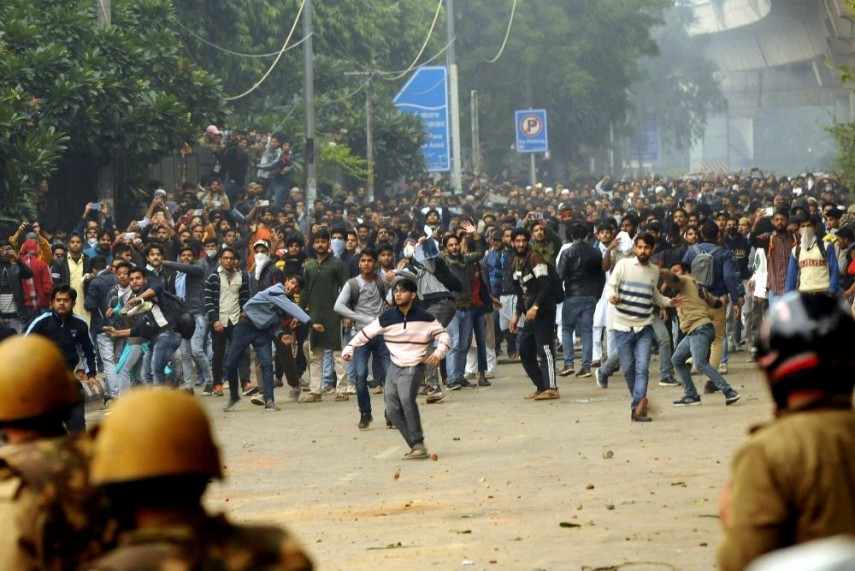As per latest intelligence reports from agencies under Ministry of Home Affairs (MHA), the Islamic fundamentalist organizations like Popular Front of India (PFI) and Students Islamic Movement of India (SIMI) are involved in the ongoing violent protests against the Citizenship Amendment Act (CAA).
“Some political parties (names withheld considering the gravity of the case) ignited the violent acts at various places, letting opportunities to sleeper cells of extremist and militant Islamic fundamentalist organisations – Popular Front of India (PFI) and Students Islamic Movement of India (SIMI),” said official from Ministry of Home Affairs.
“The aim is to disrupt law and order situation in the country,” it said.
The PFI, which describes itself as a neo-social movement committed to empower people to ensure justice, freedom and security, has various wings, including the National Women’s Front and the Campus Front of India, which could take advantage of the situation, the intelligence report said.
However, SIMI, which was involved in a series of terror acts in the country, is trying to revive its sleeper cells during the “crisis moment” in support of some political parties, the report further said.
In the last few days, there have been violent protests in Assam, West Bengal, Delhi and many other areas of the country. Many minority institutions like Aligarh Muslim University, Jamia Milia Islamia protested against the CAA.
In many areas and universities, peaceful protests turned to a violent ones after the involvement of ‘external elements’, like in Jamia, where it was found that majority of the anti-social elements were outsiders, who entered in university after the police action.
The involvement of Islamic fundamentalist organizations makes the situation dangerous, as they will try to rip apart the social fabric of the country, which can lead to violence and rioting.
Earlier, it was found that majority of PFI top commanders are from SIMI, a student organization born in Aligarh in 1990s, which was banned by the government in 2001.
Previously, the Ministry of Home Affairs (MHA) had extended the ban on the Students Islamic Movement of India (SIMI) by five years. In a notification issued on January 31, the Ministry has declared SIMI an “unlawful association” under the Unlawful Activities (Prevention) Act, 1967.
The ministry stated that if the unlawful activities of the SIMI are not controlled and curbed immediately, it would make use of such an opportunity to “continue its subversive activities and re-organise its activists who are still absconding; disrupt the secular fabric of the country by polluting the minds of the people by creating communal disharmony; propagate anti-national sentiments; escalate secessionism by supporting militancy; and undertake activities prejudicial to the integrity and security of the country.”
On the other hand, PFI, currently under investigation by the National Investigation Agency (NIA) for various charges, was banned by the Jharkhand government over their alleged links with the Islamic State (IS).
“The state has banned the Popular Front of India, which is active in Jharkhand, under the Criminal Law Amendment Act, 1908. The Home Department had recommended the ban…The PFI is very active in Pakur district. The members of the PFI, which was set up in Kerala, are influenced by the IS. According to the Home Department report, some PFI members have even gone to Syria from southern states and are working for the IS,” the statement read. The PFI has been banned under section 16 of the Criminal Law Amendment Act, 1908.
For PFI, despite being under the scanner for such serious charges there has been no dearth of political support from leaders of the Congress and other so-called secular party leaders, who on several occasions have been seen not only mingling but also promoting the radical organisation and its political wing SDPI.
Reports of PFI forming its own ‘army’ and their direct links with Pakistan’s ISI have also surfaced. Such a radical organisation operating freely and posing danger to national security and the Indian ethos certainly calls for firm action by the government agencies to curb their subversive activities.
Moreover, one of the larger political group, the Congress openly mingling with such an outfit is also worrying, however it remains to be seen how the security forces tackle this challenge of such organisations which have devised nefarious plans to exploit the open and welcoming nature of Indian society and democracy to forward their radical agenda.
